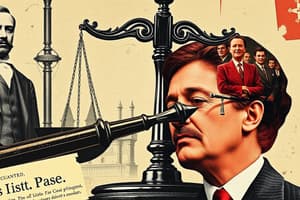Podcast
Questions and Answers
What does law express according to the critique presented?
What does law express according to the critique presented?
- Economic reductionism
- A uniform ideological foundation
- The interests of the oppressed (correct)
- A single capitalist ideology
Marx believed that law maintains production relations.
Marx believed that law maintains production relations.
True (A)
What challenge does the Marxist view face regarding the cohesive ideological foundation of law?
What challenge does the Marxist view face regarding the cohesive ideological foundation of law?
Finding a cohesive or unitary ideological foundation for various laws and legal structures is challenging.
Which of the following groups is included in the right ideological spectrum?
Which of the following groups is included in the right ideological spectrum?
Which of the following is a critique of the Marxist account of history?
Which of the following is a critique of the Marxist account of history?
The law always supports class interests according to the critique.
The law always supports class interests according to the critique.
Why is the description of society solely in terms of bourgeois versus proletariat considered problematic?
Why is the description of society solely in terms of bourgeois versus proletariat considered problematic?
What does the text suggest about the idea of ideological uniformity in law?
What does the text suggest about the idea of ideological uniformity in law?
What is the role of ideology in modern social forms according to Marx?
What is the role of ideology in modern social forms according to Marx?
Which ideology in feudal society is based on a divinely ordained social order?
Which ideology in feudal society is based on a divinely ordained social order?
Competition is viewed as inherently good according to the ideology discussed.
Competition is viewed as inherently good according to the ideology discussed.
What do Marxists believe causes confusion in society?
What do Marxists believe causes confusion in society?
What does Marx argue will happen to the state and positive law in a communist society?
What does Marx argue will happen to the state and positive law in a communist society?
Match the following ideologies to their characteristics:
Match the following ideologies to their characteristics:
Marx believed that law operates independently of economic factors.
Marx believed that law operates independently of economic factors.
What leads to the emergence of class antagonisms according to Marx?
What leads to the emergence of class antagonisms according to Marx?
What does the Marxist conception of law argue about its relation to economic interests?
What does the Marxist conception of law argue about its relation to economic interests?
The language of the law is always a true representation of equality.
The language of the law is always a true representation of equality.
What do contemporary Marxists argue about liberal democratic societies?
What do contemporary Marxists argue about liberal democratic societies?
What does Marx mean by 'fetishising the law'?
What does Marx mean by 'fetishising the law'?
According to Marx, how does law function in a class society?
According to Marx, how does law function in a class society?
How do the views of Marx differ from those of the welfare liberalism approach?
How do the views of Marx differ from those of the welfare liberalism approach?
What is the relationship between the economic base and superstructure according to Marx?
What is the relationship between the economic base and superstructure according to Marx?
Which theorist is considered on the right political spectrum?
Which theorist is considered on the right political spectrum?
Marx believed that law is a self-contained legal reasoning.
Marx believed that law is a self-contained legal reasoning.
Match the following thinkers with their political views:
Match the following thinkers with their political views:
What is the Marxist critique of Rawls' views?
What is the Marxist critique of Rawls' views?
Describe the concept of ideology in Marxism.
Describe the concept of ideology in Marxism.
Marx's historical view is known as ______.
Marx's historical view is known as ______.
What role do production methods play in social relationships, according to Marx?
What role do production methods play in social relationships, according to Marx?
Flashcards are hidden until you start studying
Study Notes
Marx's View on Law and Autonomy
- Marx argues that law is not an autonomous entity; it is intrinsically linked to class interests and serves the dominant class.
- The law acts as part of the superstructure, reflecting the needs and ideologies of the economic base or infrastructure (means of production).
- The idea of legal autonomy is critiqued as a fetishization of law, suggesting that it is viewed out of context as separate from economic and social conditions.
Legal Fetishism
- Viewing law as a distinct and rational discourse indicates a misunderstanding of its social and economic underpinnings.
- Law must be viewed in relation to its function within a class society, perpetuating the interests of the ruling class.
- Such a viewpoint neglects the power dynamics inherent in legal frameworks that are shaped by material conditions.
Accommodationism in Welfare Liberalism
- Welfare liberalism has been critiqued for merely accommodating labor while maintaining capitalist power structures.
- Marx considers welfare liberalism an accommodationist position, failing to disrupt underlying class inequalities.
- The critique includes the perception that welfare provisions serve to suppress labor agitation and prevent revolutionary change.
Impact of Production Methods on Class Relations
- Marx posits that changes in the means of production drive evolution in class relations, fundamentally shifting societal dynamics.
- Historical changes in production lead to transformations in social, political, and legal relationships.
Ideology and Legal Systems
- Marx views ideology as a framework that shapes collective beliefs and norms within specific groups, often aligning with dominant economic interests.
- Legal systems are seen as reflections of ideology, structured to regulate and standardize societal behavior according to the ruling class's norms.
Critique of Hegelian Idealism
- While Hegel argues that ideas drive historical progress, Marx contends that material conditions, rather than ideas, are the primary movers of history.
- Hegel's approach is considered elitist, focusing primarily on superstructure without acknowledging the economic base's influence.
Class Society Regulation
- Laws are products of institutional regulation that perpetuate the interests of the dominant class.
- The connection between base (economic structure) and superstructure (law, culture, politics) reveals that social norms cannot be separated from material conditions.
Influence of Historical Context on Legal Practice
- Understanding the evolution of legal practices requires an examination of historical material conditions driving societal changes.
- Legal practices must align more closely with reality, evolving through challenges and contradictions within existing frameworks.
Marxist Jurisprudence vs. Welfare Liberalism
- Marxism rejects the notion that legal frameworks can exist outside economic influences, positioning law as a tool for class dominance.
- Welfare liberalism is criticized for maintaining inequalities while superficially addressing labor concerns through social programs.
Critique of Consequentialism in Law
- Criticism of welfare liberalism emphasizes that even beneficial social programs can reinforce existing power dynamics rather than creating genuine equality.
- Legal autonomy is questioned as long as laws fundamentally serve the needs of the ruling capitalist class.
Ideology as Reality
- In Marxist theory, ideologies are not just frameworks but are accepted as true realities by the groups that hold them.
- These ideologies are absorbed unconsciously and shape individuals' views on societal norms and legal expectations.
Historical Materialism
- Marx's notion of historical materialism emphasizes that material conditions underpin historical progress, contrasting sharply with Hegelian idealism.
- The economic base and relations of production are crucial for understanding societal structures and the function of law within them.### IDEOLOGY AND SOCIAL COMPETITION
- Modern practices appear inefficient compared to historical practices, which would seem strange in contemporary Australia.
- Marxist theory highlights that societal norms arise from an ideology of consumptive individualism, which values competition for resources.
- Competition is viewed as a positive aspect of social life, while alternative views (e.g. cooperation) are often dismissed due to ideological biases.
SELF-FULFILLING IDEOLOGY
- A competitive view of social life fosters a self-fulfilling ideology, driving behaviors that reinforce competitive beliefs.
- Ideologies, operating in the background, shape intuitive responses and require critical reflection to avoid autopilot judgments.
IMPLICATIONS OF MARXIST THEORY
- Marx theorizes that ideologies emerge from social forms, such as capitalism, which dictate norms and values.
- As economic bases evolve, old ideologies may collapse, leading to confusion and the rise of new ideologies aligned with these changes.
- Example of feudal society illustrating how ideologies tied to class structures disintegrated during transitions to post-feudal society.
MARX'S HISTORICAL NARRATIVE
- History begins with egalitarian societies, which evolve into classed societies driven by production modes.
- Turmoil arises from class antagonisms, often alleviated through ideological mechanisms (e.g. religious justifications).
- Legal and political institutions emerge as institutional mechanisms to uphold the dominant class's power, providing a façade of rationality.
CURRENT SITUATION
- Proletariat revolution is viewed as inevitable, bringing about communism—the highest socio-economic development phase according to Marx.
- Marx's belief in linear historical progression assumes continual economic base improvement, contrasting with potential regressions like a return to feudalism.
DISSOLUTION OF LAW AND THE STATE POST-REVOLUTION
- The proletariat revolution envisions a return to a classless society where production is collectively owned.
- In communism, the law and state become unnecessary, as historical class tensions dissipate and societal governance shifts to communalism.
- Marx argued that law is not autonomous but reflects underlying economic needs and serves the interests of the dominant class.
MARXIST CONCEPTION OF LAW
- Law is intertwined with the economic base, accommodating society's class structure and reflecting economic interests.
- Viewing law as autonomous neglects its role as a tool of social domination and fails to appreciate the influence of various factors aside from economic conditions.
ENDURING ASPECTS OF MARXISM
- Social inequality leads to instability and crisis, with extreme inequality stemming from unregulated capitalism.
- Contemporary Marxists assert that liberal democracies perpetuate class domination through support for capitalist forms.
REJECTION OF LEGAL AUTONOMY
- Marxist critiques effectively challenge the notion of legal autonomy and its implications.
- Even non-Marxist frameworks, such as American Realism, question the independence of law from socio-economic influences.
CRITICISMS OF MARXIST CONCEPTION OF LAW
- Purely viewing law as an instrument of class domination overlooks instances where law supports the marginalized or lower classes.
- The assumption that law stems from a unified ideological foundation is flawed; legal structures reflect a chaos of contesting ideologies in a pluralistic society.
- Economic reductionism limits the understanding of law and history, disregarding the significant role of human thought and ideas.
- Describing society solely in terms of bourgeois versus proletariat fails to address current societal complexities and legal decision-making processes.
CONCLUSION
- Marx's framework presents a lens for understanding law as a reflection of socio-economic conditions, but is critiqued for its oversimplification and failure to account for the dynamic nature of law in the context of societal evolution.
Studying That Suits You
Use AI to generate personalized quizzes and flashcards to suit your learning preferences.




